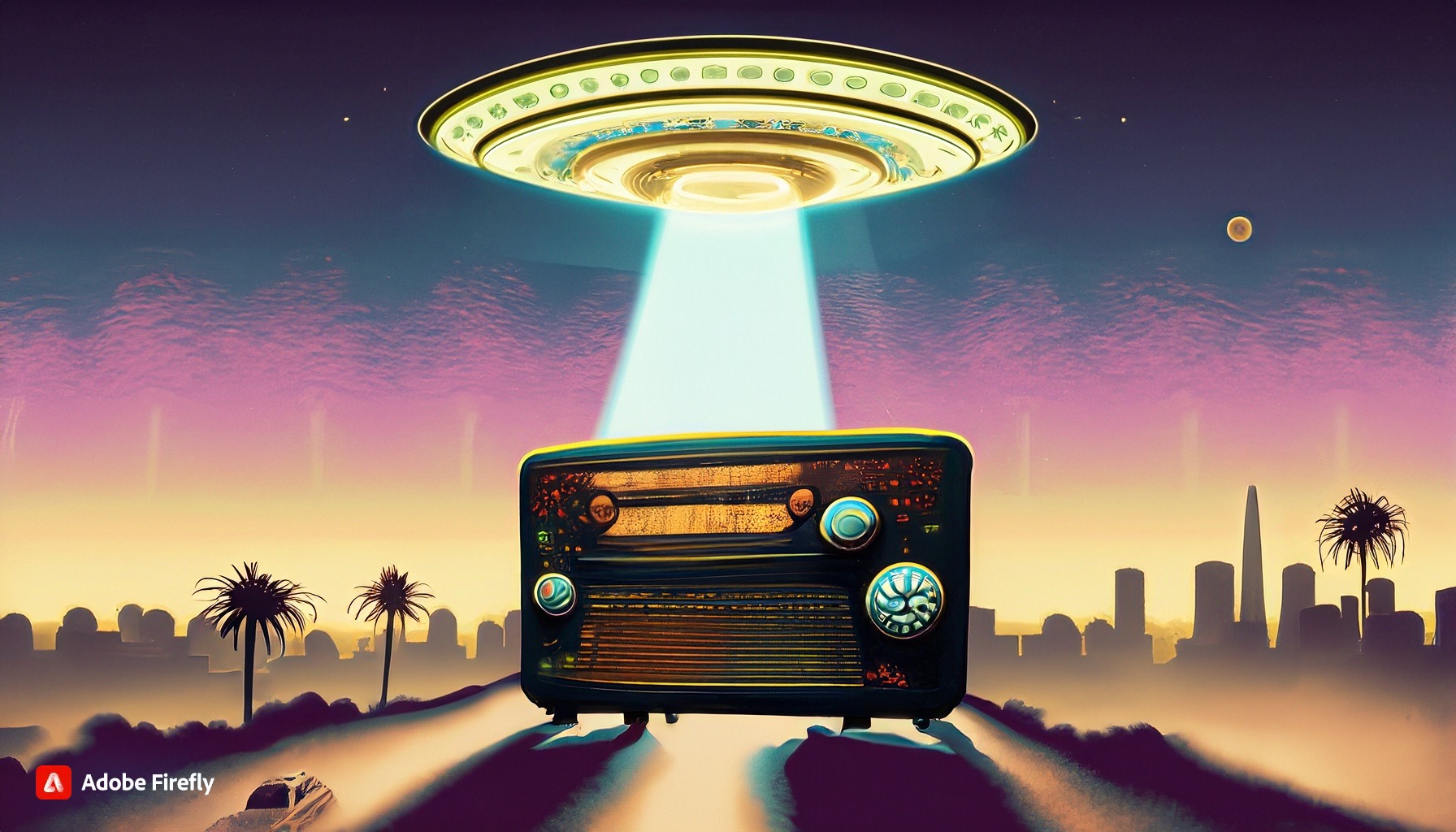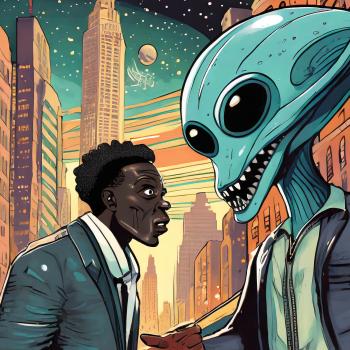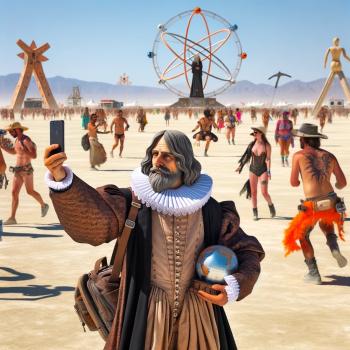
A Skeptic Has a Supernatural Experience
Michael Shermer serves as the Executive Director of the Skeptics Society. For eighteen years, he wrote a monthly column for Scientific American called Skeptic. He’s also the Founding Publisher of Skeptic Magazine. From this list, any skepticism you might have had about Shermer’s skepticism should have been put to rest.
His skepticism is primarily directed at pseudoscience and religion. If pressed, he will admit that not only is he a skeptic and an agnostic, but also an atheist. With these bona fides established, consider a story he related in 2014.
In June of that year, he was getting married. His fiancée, Jennifer Graf, was from Germany and had been raised by her mother. Though her father wasn’t in the picture, she had a grandfather, Walter, who assumed that role. Unfortunately, he died when she was only sixteen.
When Graf came over from Germany she brought with her several heirlooms of her grandfather, including some binoculars and a 1978 transistor radio. The radio hadn’t worked in many years and Shermer set about to repair it, since it was emblematic of the grandfather his fiancée had loved so very much. Unfortunately despite all of his efforts he could never get the radio to work and so he put it away in a desk drawer and forgot about it. I’ll let him relate what happened next:
Three months later, after affixing the necessary signatures to our marriage license at the Beverly Hills courthouse, we returned home, and in the presence of my family said our vows and exchanged rings. Being 9,000 kilometers from family, friends and home, Jennifer was feeling amiss and lonely. She wished her grandfather were there to give her away. She whispered that she wanted to say something to me alone, so we excused ourselves to the back of the house where we could hear music playing in the bedroom.
They looked all over for the source of the music, thinking it was an errant iPod, one of their laptops, or perhaps the neighbors. It was none of these things. Increasingly mystified, for a moment they wondered if their printer/scanner/fax was a printer/scanner/fax/radio. And then:
Jennifer shot me a look I haven’t seen since the supernatural thriller The Exorcist startled audiences. “That can’t be what I think it is, can it?” she said. She opened the desk drawer and pulled out her grandfather’s transistor radio, out of which a romantic love song wafted. We sat in stunned silence for minutes. “My grandfather is here with us,” Jennifer said, tearfully. “I’m not alone.”
…Later that night we fell asleep to the sound of classical music emanating from Walter’s radio. Fittingly, it stopped working the next day and has remained silent ever since.
The symbolism, the timing, the fact that it was perfectly tuned to an appropriate station, could not be easily dismissed:
Jennifer is as skeptical as I am when it comes to paranormal and supernatural phenomena. Yet the eerie conjunction of these deeply evocative events gave her the distinct feeling that her grandfather was there and that the music was his gift of approval. I have to admit, it rocked me back on my heels and shook my skepticism to its core as well.
In his eighteen years of writing for Scientific American, no column generated more mail than that one. Most of the letters recounted similar experiences, events that were not impossible, but highly improbable given their perfect timing and implied message. In a word, a myriad of people replied to Shermer’s column with their own, personal miracles.
Perhaps you have had a similar experience or have heard of such happenings.
Shermer’s story is notable only in that it happened to someone who has spent his life denying that such things are possible.
Supernatural Radios v. UFO Videos
Aliens have been in the news a lot recently. The current excitement started when some videos of UFOs—or as they’re now called, unidentified anomalous phenomena—were released by the Pentagon in 2020. More importantly, many well known individuals from senators to public intellectuals argued that we should take all this evidence seriously. That these videos depict actual aliens.
More recently, in July a “whistleblower” claimed that the government was in possession of alien craft and alien bodies. But the whole affair reached a weird crescendo just a few days ago when an alleged alien corpse was displayed to the Mexican congress.
I’m not aware of any notables urging that the alien corpse is genuine, but many people still feel that the Pentagon videos should be taken seriously. But many of these same people would argue against taking supernatural phenomena seriously. Phenomena like the one I just recounted. These people are happy to admit the possibility of aliens, but scoff at things like near death experiences, or the existence of God. All this in spite of the fact that there is a far greater quantity of evidence for all of those things.
Given this disparity, why are people so willing to give UFO videos the benefit of the doubt, but so quick to dismiss similar evidence for the supernatural, or God?
Someone might argue that the videos are in a different category than the story I just related. But are they really? I’m not sure how many people were at Shermer’s wedding, but they all witnessed the radio playing. They could have presumably handled it, fiddled with it, run various tests, etc. Now that it has stopped playing, presumably anyone who desires to could try to repair it, or come up with some other way of explaining how it happened. I’m sure Shermer would actually be glad to let you look at it. He seems eager for any explanation other than his wife’s dead grandfather communicating with her from beyond the grave.
Beyond examining these two specific examples, there are probably some more general factors at work.
- One reason for the disparity is its novelty. While reports of the supernatural have been around for thousands of years, UFOs really only started being a thing after World War II. Even then, interest in them had mostly died down until the release of the videos in 2020.
- Additionally, people are curious. There is a sense that some kind of amazing revelation might be just around the corner and imagine that any day we might see actual, indisputable proof that we are not alone in the universe. Even if it turned out that the UFOs were not aliens, but rather secret high-tech military drones, it would still be a story. But this curiosity is denied to us by the supernatural. If there were some amazing revelation to be had it has already happened, and now the idea that God once walked among men is the domain of ancient, dusty churches and fussy, old people.
- Beyond the novelty and curiosity UFOs fit better with our modern ideology. We imagine that we’re technologically sophisticated people and we will continue to do amazing things. UFOs are evidence that this is true. That a bright and interesting technological future awaits us, because somewhere out there are other beings who are already experiencing this interesting future.
All of these factor into the disparity between those who want to believe in aliens, but don’t want to believe in the supernatural. But I think there’s one final factor that overwhelms everything else: the supernatural requires something of us.
At the most extreme end, a specifically-religious miracle provides evidence for the truth of that religion, and if the religion is true then so is its doctrine, which almost certainly includes exhortations, prohibitions, and duties. Even supernatural events which occur in the absence of any religious context, like the story of the radio above, ask us to believe in things like life after death, the existence of a soul, or just things beyond the perception of science.
Aliens make no such demands. If, to the amazement of everyone, the corpse displayed to the Mexican congress turned out to be authentic, what behavior would it necessitate? What moral rules would it strengthen? Or weaken?
By my estimation, none whatsoever.
Certainly it would be an amazing development, and numerous things would change, but at the moment the potential for wonder and novelty is so great that it completely overwhelms any consideration of what the eventual impact might be. This creates an infatuation with the idea that is both popular and trivial (a common combination these days).
The supernatural does not have the advantage of this novelty. As many have remarked, this sort of wonder has been drained from the world. Modern civilization is disenchanted.
The existence of God introduces responsibilities.
The existence of aliens does not.
As a consequence, it behooves us to be far more interested in the former than the latter.
If you prefer to listen to this and other posts click here.












